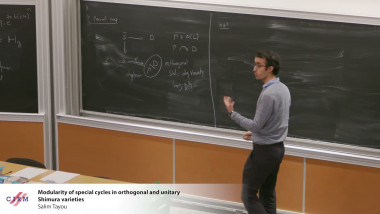![[1242] Réfutation de la conjecture du télescope de Ravenel](/media/cache/video_light/uploads/video/SeminaireBourbaki.jpg)
[1242] Réfutation de la conjecture du télescope de Ravenel
By Christian Ausoni

Modularity of special cycles in orthogonal and unitary Shimura varieties
By Salim Tayou
By Marc Levine
Appears in collection : Cohomological Methods in the Theory of Algebraic Groups
After inverting 2, the motivic sphere spectrum splits into a plus part and a minus part with respect to a certain natural involution. Cisinsky and Déglise have shown that, with rational coefficients, the plus part is given by rational motivic cohomlogy. With Ananyevskiy and Panin, we have computed the minus part with rational coefficients as being given by rational Witt-theory. In particular, this shows that the rational bi-graded homotopy sheaves of the minus sphere are concentrated in bi-degree (n,n). This may be rephrased as saying that the graded homotopy sheaves of the minus sphere in strictly positive topological degree are torsion. Combined with the result of Cisinski-Déglise mentioned above, this shows that the graded homotopy sheaves of the sphere spectrum in strictly positive topological degree and non-negative Tate degree are torsion, an analog of the classical theorem of Serre, that the stable homotopy groups of spheres in strictly positive degree are finite.
